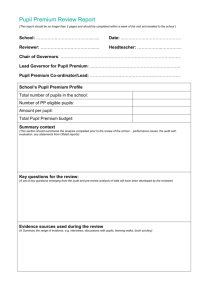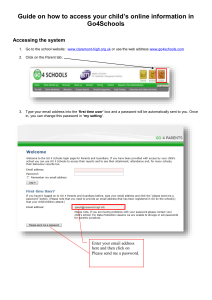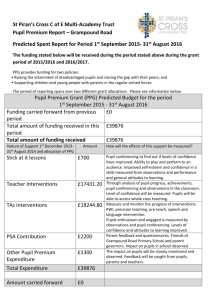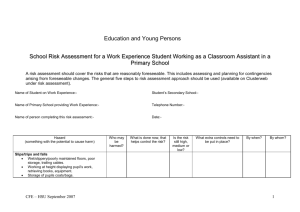Policy for Supporting Pupils with Medical Conditions
advertisement
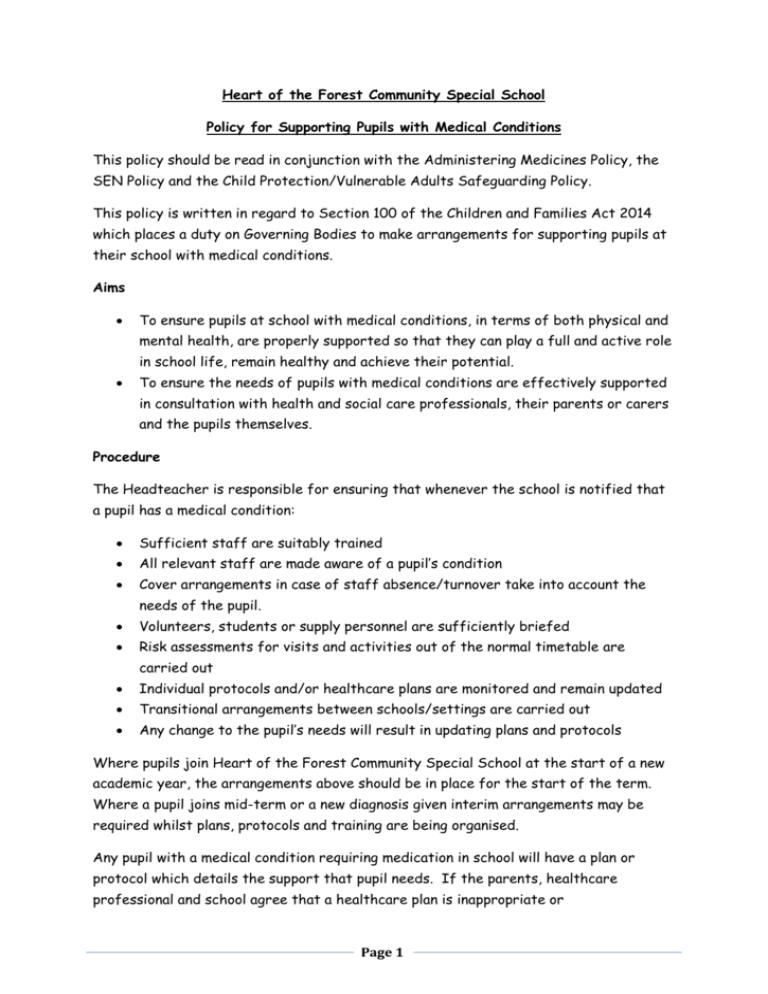
Heart of the Forest Community Special School Policy for Supporting Pupils with Medical Conditions This policy should be read in conjunction with the Administering Medicines Policy, the SEN Policy and the Child Protection/Vulnerable Adults Safeguarding Policy. This policy is written in regard to Section 100 of the Children and Families Act 2014 which places a duty on Governing Bodies to make arrangements for supporting pupils at their school with medical conditions. Aims To ensure pupils at school with medical conditions, in terms of both physical and mental health, are properly supported so that they can play a full and active role in school life, remain healthy and achieve their potential. To ensure the needs of pupils with medical conditions are effectively supported in consultation with health and social care professionals, their parents or carers and the pupils themselves. Procedure The Headteacher is responsible for ensuring that whenever the school is notified that a pupil has a medical condition: Sufficient staff are suitably trained All relevant staff are made aware of a pupil’s condition Cover arrangements in case of staff absence/turnover take into account the needs of the pupil. Volunteers, students or supply personnel are sufficiently briefed Risk assessments for visits and activities out of the normal timetable are carried out Individual protocols and/or healthcare plans are monitored and remain updated Transitional arrangements between schools/settings are carried out Any change to the pupil’s needs will result in updating plans and protocols Where pupils join Heart of the Forest Community Special School at the start of a new academic year, the arrangements above should be in place for the start of the term. Where a pupil joins mid-term or a new diagnosis given interim arrangements may be required whilst plans, protocols and training are being organised. Any pupil with a medical condition requiring medication in school will have a plan or protocol which details the support that pupil needs. If the parents, healthcare professional and school agree that a healthcare plan is inappropriate or Page 1 disproportionate a record of the child’s medical condition and any implications for the child will be kept in the school’s medical records and the pupil’s individual record. Plans and protocols The following information should be considered when developing the pupil’s plan/protocol: The medical condition, its triggers, signs, symptoms and treatments The pupil’s resulting needs, including medication and other treatments, times, facilities, equipment, testing, dietary requirements and environmental issues Specific support for the pupil’s educational, social and emotional needs The level of support needed including in emergencies Who will provide support, their training needs, the expectations of their role, confirmation of their proficiency and cover arrangements Who in school needs to be aware of the pupil’s condition and the support required Arrangements for written permission from parents and the Headteacher for medication to be administered by a member of staff or self-administered (pupils who are competent should be encouraged to take responsibility for managing their own medicines and procedures where it is safe to do so and with an appropriate level of supervision) Separate arrangements or procedures required for school trips or other school activities outside of the normal school timetable that will ensure the pupil can participate Confidentiality What to do if a pupil refuses to take medicine or carry out a necessary procedure What to do in an emergency, who to contact and contingency arrangements The pupil’s SEN if it impacts on their medical condition and its treatment Roles and responsibilities Supporting a pupil with a medical condition during school hours is not the sole responsibility of one person. The school will work collaboratively with any relevant person or agency to provide effective support for the pupil. The Governing Body Must make arrangements to support pupils with medical conditions and ensure that this policy is developed and implemented Page 2 Must ensure that sufficient staff receive suitable training and are competent to support pupils with medical conditions Must ensure the appropriate level of insurance is in place and appropriately reflects the level of risk The Headteacher Should ensure that all staff are aware of this policy and understand their role in its implementation Should ensure that all staff who need to know are informed of a pupil’s condition Should ensure that sufficient numbers of staff are trained to implement this policy and deliver plans /protocols, including in emergency and contingency situations. And they are appropriately insured Is responsible for monitoring individual plans/protocols Should contact the school nursing team in the case of any child with a medical condition who has not been brought to their attention School staff Any member of staff may be asked to provide support to pupils with medical conditions, including the administering of medicines, although they cannot be required to do so Should receive sufficient and suitable training and achieve the necessary level of competency before taking on the responsibility of supporting pupils with medical conditions Any member of staff should know what to do and respond accordingly when they become aware that a pupil with a medical condition needs help School nurses Are responsible for notifying the school when a pupil has been identified as having a medical condition which will require support in school May support staff on implementing individual plans and protocols and ensure that they are up-to-date. These care plans include emergency medication care plans (epilepsy), respiratory care plans and feeding plans provide advice and liaison with lead health professionals concerning medical conditions and medication surrounding the condition May provide appropriate training and awareness sessions to staff and check that they have the necessary level of competency. The school nurse service is responsible for delivering Epilepsy Awareness sessions, Anaphylaxis awareness sessions, and Asthma Awareness sessions. Page 3 Can support the school in accessing (other health professional delivery) Gastrostomy training, respiratory training, emergency epilepsy medication training, endocrine training and diabetes training. Other healthcare professionals (e.g. epilepsy nurse, dietician, respiratory nurse, community nursing team, paediatrician) Should notify the school nurse when a pupil has been identified as having a medical condition that will require support from the school May provide plans/protocols and/or may provide advice on developing plans/protocols. Care plans are ultimately the responsibility of the health Service that has written them. Specialist local teams may be able to provide support and training for particular conditions (e.g. asthma, diabetes, epilepsy) Pupils Should, where possible, be involved in discussions about their medical support needs and contribute to, and comply with their individual plans/protocols Parents and carers Must provide the school with sufficient and up-to-date information about their child’s medical needs Are key partners and should be involved in individual plans and protocols Should carry out any action they have agreed as part of the individual plan/protocol Notes The school does not have to accept a pupil identified as having a medical condition at times when it would be detrimental to their health to do so. The following practice is considered to be not acceptable: Preventing pupils from easy access to their medication and administering it when and where necessary Assuming pupils with the same condition require the same treatment Ignoring the views of the pupil, their families; ignoring medical advice or opinion Sending pupils with medical conditions home frequently or preventing them from staying for normal school activities (unless specified in their individual plans/protocols) Page 4 Penalizing pupils for their attendance record if their absences are related to their medical condition that is recognised in this policy Preventing pupils from drinking, eating or taking toilet breaks whenever they need to in order to manage their medical condition effectively To require parents to attend school to administer medication or provide medical support to their child. Preventing pupils from participating, or create unnecessary barriers to pupils participating in any aspect of school life, including school trips. Complaints Should parents or carers or pupils be dissatisfied with the support provided they should discuss their concerns directly with the school. If this does not resolve the issue, they may wish to make a formal complaint via the school’s complaint procedure. Monitoring, Evaluation and Review This policy undergoes a review annually by Governors from the date of this document. Ratified on: 10th February 2015 Chair of the Governing Body: Sue Henchley Page 5



